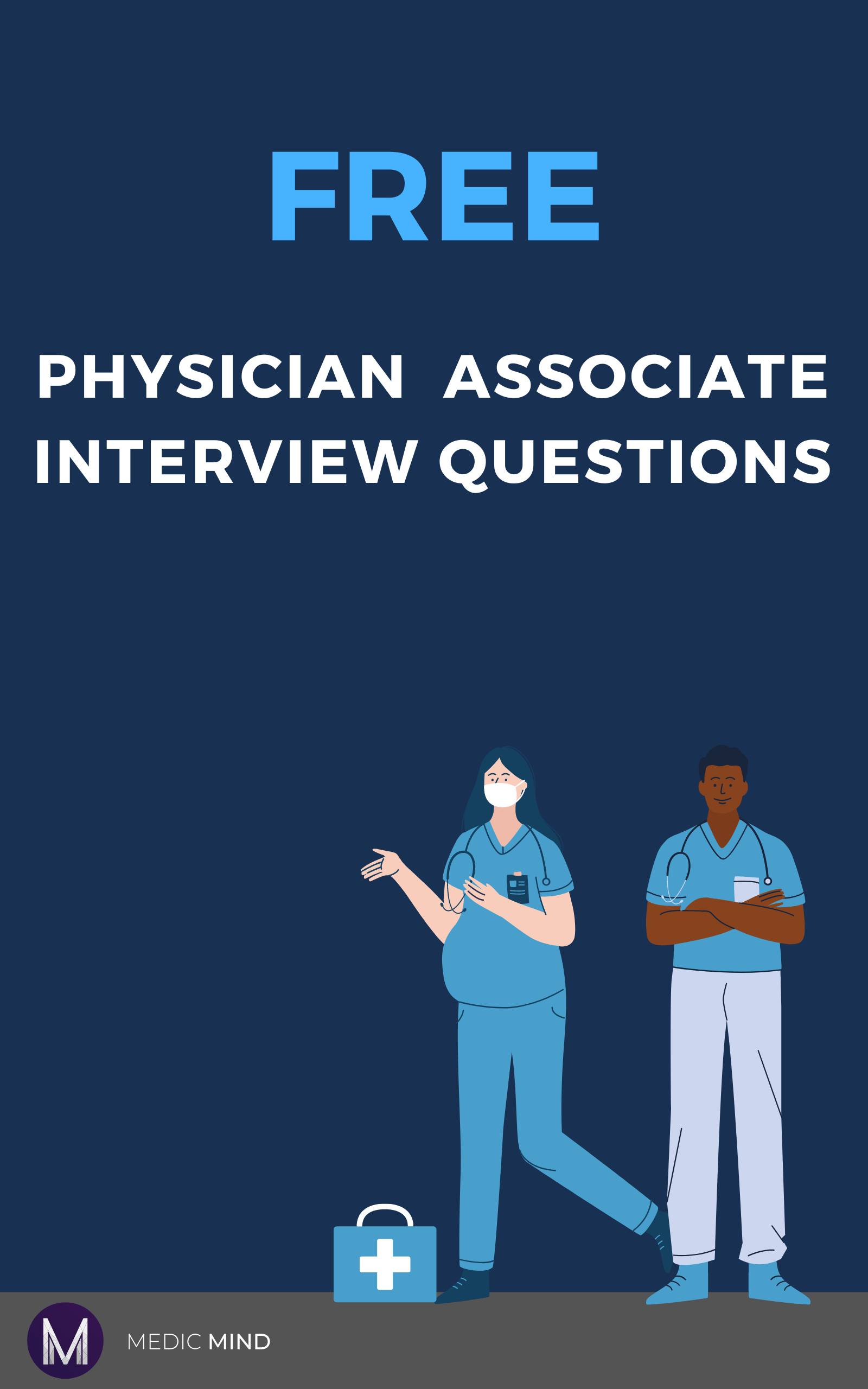Loading...

50 Must-Know Physician Associate Interview Questions
Did you know the demand for Physician Associates in the UK is rising? Therefore, interviews are becoming more challenging. But don’t fret; we’ve got your back.
Here are 50 must-know Physician Associate interview questions covering the essential topics and skills that university admissions tutors are looking for. From medical knowledge to patient care scenarios, we’ve got it all.
So, let’s dive in!
Why Interview Questions Matter
In the competitive healthcare world, the Physician Associates interview process is pivotal to shaping your career. Understanding why interview questions matter is the first step to mastering them.
Selecting the Best Fit:
Interview questions are a crucial tool for employers to assess your qualifications and compatibility with their organization. The questions are designed to identify candidates who not only have the necessary skills but also align with the institution’s values and culture.
Spotlight on Problem-Solving Skills:
Interview questions are carefully crafted to delve into your problem-solving abilities. They present real-world scenarios that you may encounter in your role as a Physician Associate. A well-structured answer demonstrates your capacity to handle challenging situations effectively.
Demonstration of Communication Skills:
Effective communication is fundamental in healthcare. Interview questions provide an opportunity to showcase your communication skills. Clear, concise, and empathetic responses indicate your ability to interact with patients and colleagues.
Assessing Critical Thinking:
Healthcare is a dynamic field that demands critical thinking. Interview questions gauge your ability to think on your feet, make informed decisions, and adapt to evolving situations—a vital trait for any Physician Associate.

A Chance to Stand Out:
With many candidates vying for limited positions, well-answered interview questions can set you apart from the competition. A strong response can leave a lasting impression on the interview panel.
In summary, interview questions are not mere formalities but powerful tools institutions use to evaluate your qualifications and suitability. By recognizing their significance, you’re better able to stand out effectively during the interview process. Now, let’s look at the essential Physician Associate interview questions that will help you succeed.
Top 50 Physician Associate Interview Questions
These questions are designed to assess your motivation, understanding of the role, and your ability to reflect on relevant experiences. Below, we’ve grouped them into relevant categories for convenience:
A. Motivation and Understanding
- Why do you want to become a Physician Associate?
- What interests you about this university’s Physician Associate program?
- Describe your understanding of the role of a Physician Associate.
- Can you share a specific experience from your work or studies that motivated you to pursue a career as a Physician Associate?
- What qualities do you believe are essential for a successful Physician Associate, and how do you embody them?
- How do you envision the role of a Physician Associate evolving in modern healthcare?
- What do you think are the primary responsibilities of a Physician Associate in a healthcare team?
- How does the role of a Physician Associate differ from that of a physician or nurse?
- In your opinion, what are the biggest challenges currently facing healthcare, and how can Physician Associates help address them?
- What contributions can you make to the field of healthcare as a Physician Associate?
- How familiar are you with the curriculum of the Physician Associate programme at this university?
- What aspects of the curriculum are you most excited about and why?
B. Experiences and Observations
- Tell me about a time within your work or volunteer experience when you observed a Physician Associate in action.
- Have you witnessed any challenges or opportunities in healthcare that you believe a Physician Associate could address effectively?
- Describe a situation where you saw effective teamwork in a healthcare setting. How did it impact patient care?
- Can you recall an experience where a healthcare provider’s communication skills made a positive difference in patient outcomes?
- Share an example of a patient-provider interaction that left a lasting impression on you.
- Have you explored different healthcare settings to gain a better understanding of the roles within healthcare teams?
- Describe any experiences where you had to collaborate or saw collaboration with healthcare professionals from various backgrounds.
- How do you plan to leverage your prior experiences to excel in the Physician Associate program?
- What do you hope to learn from experienced healthcare practitioners during your studies?
- How do you see the role of a Physician Associate complementing other healthcare professions?
C. Decision-making and Problem-Solving
- Describe a time when you had to make an important decision under pressure. How did you approach it?
- How do you prioritize tasks and responsibilities when dealing with multiple patient needs?
- Have you encountered situations where interdisciplinary collaboration improved patient care? Please provide an example.
- What are your thoughts on the potential benefits and challenges of telemedicine in healthcare?
- How do you plan to stay organized and manage your workload effectively as a student and future Physician Associate?
- In a rapidly evolving healthcare landscape, how do you stay informed about the latest medical advancements and guidelines?
- Can you share an example of a situation where critical thinking played a crucial role in a successful outcome?
- How would you approach a complex medical case with limited information available?
- Can you describe a time when you had to adapt to unexpected outcomes or difficulties and what strategies did you use?
- Can you describe an experience where you had to advocate for a change or improvement in an aspect of your life?
D. Communication and Interpersonal Skills
- How would you communicate effectively with patients who have limited English proficiency?
- Describe an experience where you provided emotional support to a distressed individual.
- What strategies would you use to educate patients about their medical conditions and treatment plans?
- How do you approach disagreements or conflicts with others
- Explain the importance of active listening in healthcare and how you would implement it.
- Share an experience where you had to simplify complex information so that the other person could understand.
- Can you provide an example of a time when you successfully resolved a communication challenge?
- How do you (or would you) adapt your communication style when interacting with people of different ages or cultural backgrounds?
- Describe your understanding of the importance of ensuring patient confidentiality and privacy in a healthcare environment.
- How do you handle situations where patients express dissatisfaction with their care, and what steps do you take to address their concerns?
- Can you share a scenario where you had to communicate effectively in a high-stress situation?
E. Personal Qualities and Self-Reflection
- What personal qualities and strengths do you believe will contribute to your success as a Physician Associate?
- Can you identify areas where you may need to further develop your skills or knowledge to excel in this role?
- Describe a time when you faced a challenge, and what did you learn from the experience?
- How do you plan to balance the demands of the Physician Associate programme with your personal life and well-being?
- What do you believe are the ethical responsibilities of a healthcare professional, and how will you uphold them as a Physician Associate?
- In what ways do you plan to contribute to the university’s community and the field of healthcare during your time as a student?
- What are your long-term goals as a Physician Associate, and how do you envision making a meaningful impact in the healthcare industry?
The Crux
In your journey to becoming a Physician Associate, interview preparation is paramount. These 50 questions equip you to shine in the spotlight. Remember, practice is vital. Now, prepare yourself with these insights and go ace that interview! If you want personalized guidance, mock interviews, and complete training, consider Medic Mind’s Physician Associate interview tutoring. It’s your path to interview excellence. Take advantage of this; grab your chance today!
FAQs:
Q1: Is it essential to follow up with a thank-you note after the interview, and what should it include?
Answer: Following up with a thank-you note is a courteous and professional gesture that can leave a positive impression. In your message, express gratitude for the opportunity to interview and reiterate your interest in the position.
Highlight one or two key points from the interview that emphasize your qualifications or alignment with the institution. Keep the note concise and personalized, and send it within 24-48 hours of the discussion to show your eagerness and professionalism.
Q2: What should I do if I don’t know the answer to an interview question during the interview?
Answer: If you encounter a question you’re unsure about, don’t panic. It’s okay to admit that you don’t know the answer, but follow it up with a willingness to learn and a desire to research the topic further. Interviewers often appreciate honesty and your willingness to improve. Use this opportunity to show your problem-solving skills by discussing how you would seek the answer after the interview.
Q3: Can you provide tips for managing interview anxiety and nerves?
Answer: Interview anxiety is common, but there are effective strategies to manage it. First, thorough preparation is critical; knowing your material inside out boosts confidence. Deep breathing exercises and positive self-talk can help calm nerves. Arriving early and visualizing a successful interview can also alleviate anxiety.
Q4: What’s the role of body language during the interview, and how can I ensure it’s sending the right signals?
Answer: Body language plays a significant role in conveying confidence and professionalism. Maintain good posture, make eye contact, and offer a firm handshake when appropriate.
Avoid fidgeting or excessive gestures that can distract from your message. Pay attention to your facial expressions; they should reflect your engagement and interest in the conversation.
Q5: What’s the best way to research the institution before the interview, and why is it important?
Answer: Researching the institution is vital as it demonstrates your genuine interest and preparedness. Start by thoroughly exploring their website, mission statement, values, and recent news or publications. Review the curriculum offered and teaching style. During the interview, you can reference this research to highlight how your skills and values align with the teaching provided, which can significantly impress the interview panel.





Was this article helpful?
Still got a question? Leave a comment
Leave a comment